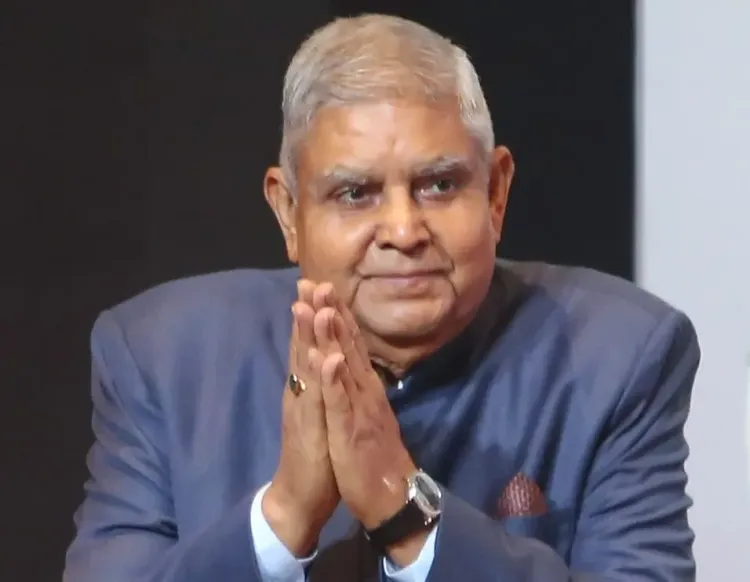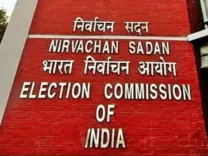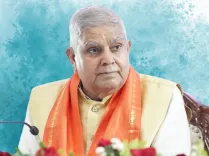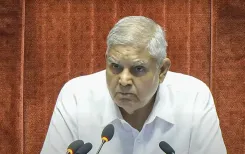What Led to Jagdeep Dhankhar's Resignation as Vice President?

Synopsis
Key Takeaways
- Jagdeep Dhankhar served as India’s 14th Vice President from 2022 to 2025.
- He resigned on July 21, 2025, citing health issues.
- Dhankhar's tenure was marked by significant political confrontations.
- He won the Vice Presidential election with a record margin.
- His journey reflects the importance of legal expertise in politics.
New Delhi, July 21 (NationPress) Jagdeep Dhankhar, a distinguished legal expert and political personality, has served as the 14th Vice President of India from 2022 until his resignation on July 21, 2025. He stepped down from his Vice Presidential role due to health reasons.
Although his time in office was brief, it was characterized by his strong grasp of parliamentary procedures and keen legal insight. Throughout his public career, he remained actively involved in pressing national matters.
Dhankhar’s ascent from a humble village in Rajasthan to one of the nation’s highest constitutional roles is a testament to his dedication, adaptability, and commitment to public service. He has dedicated over forty years to public life.
Born on May 18, 1951, in Kithana, a small village in Jhunjhunu district, Rajasthan, Jagdeep Dhankhar comes from a simple farming lineage. He was often referred to as a “Kisan Putra” (son of a farmer), a background the BJP emphasized in their political strategy during his Vice Presidential nomination.
He completed his education at Sainik School, Chittorgarh, which is renowned for producing numerous distinguished military and public service figures. He later earned a Bachelor of Science degree from the University of Rajasthan, Jaipur, and subsequently obtained his LLB from the same institution.
Dhankhar began his legal career in 1979 after registering with the Bar Council of Rajasthan. His reputation as a formidable legal expert quickly blossomed. In 1990, he was designated as a Senior Advocate by the Rajasthan High Court, establishing himself as one of the state’s leading legal professionals.
He practiced across various high courts and in the Supreme Court of India, tackling a diverse array of civil and constitutional matters. Dhankhar was appointed as the President of the Rajasthan High Court Bar Association, further solidifying his prominence within the legal fraternity.
Entering the political arena in 1989, he secured a Lok Sabha seat from Jhunjhunu on a Janata Dal ticket. His articulate advocacy in Parliament soon led to a ministerial position. Under Prime Minister Chandra Shekhar in 1990, he was appointed Minister of State for Parliamentary Affairs, where he facilitated crucial interactions between the government and the legislature.
He later represented the Kishangarh constituency in the Rajasthan Legislative Assembly from 1993 to 1998.
Dhankhar remained politically engaged, aligning himself with various parties, including Janata Dal, Indian National Congress (INC), and ultimately the Bharatiya Janata Party (BJP).
In July 2019, he was named the Governor of West Bengal, a role that placed him at the center of political upheaval in the state. His term was characterized by frequent clashes with the Trinamool Congress (TMC) government led by Mamata Banerjee over issues of federalism, university appointments, and law and order.
His detractors accused him of exceeding constitutional limits, but Dhankhar maintained that he acted to uphold democratic values.
On July 16, 2022, the BJP designated Dhankhar as the National Democratic Alliance (NDA) candidate for Vice President. In the Vice Presidential election held on August 6, 2022, he defeated opposition candidate Margaret Alva, securing 528 out of 710 valid votes, which is approximately 74.37 percent - the highest victory margin since 1992. Notably, the Trinamool Congress abstained from voting, with only two of its members participating.
As Vice President, Dhankhar also acted as the ex-officio Chairman of the Rajya Sabha, where he presided over several significant legislative sessions. Known for his strict adherence to parliamentary norms and a no-nonsense approach, he garnered both respect and controversy across party lines.





